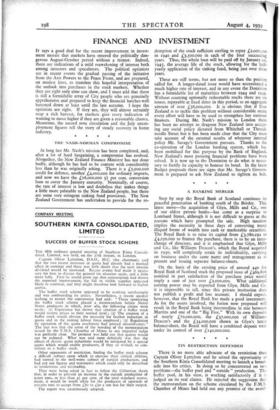A BANKING MERGER
Step by step the Royal Bank of Scotland continues its peaceful penetration of banking south of the Border. This latest move—the acquisition of Glyn, Mills and Co., one of our oldest private banks—has come as a surprise to Lombard Street, although it is not difficult to guess at the reasons which have prompted the sale. High taxation implies the necessity in these days of converting many illiquid forms of wealth into cash or marketable securities. The Royal Bank is to raise its capital from £3,780,192 to ,C4,250,000 to finance the purchase, there is to be an inter- change of directors, and it is emphasised that Glyn, Mills and Co., like Williams Deacon's, which the Royal acquired in 1930, will completely retain its individuality, carrying on business under the same name and management as at present and issuing separate balance-sheets.
On the basis of the existing price of around 440 for Royal Bank of Scotland stock the proposed issue of £469,808 nominal in part satisfaction of the purchase price would imply a sum of just over £2,000,000. What additional earning power may be expected from Glyn, Mills and Co. it is impossible to tell, since this private institution does not publish a profit and loss account. I should expect, however, that the Royal Bank has made a good investment. As for the assets involved, the fusion now proposed will result in the Royal Bank being intermediate in size between Martins and one of the " Big Five." With its own deposits of nearly £70,000,000, the £37,000,000 of Williams Deacon's and the £34,000,000 shown in Glyn's latest balance-sheet, the Royal will have a combined deposit total under its control of over £140,000poo.
* * * *








































 Previous page
Previous page